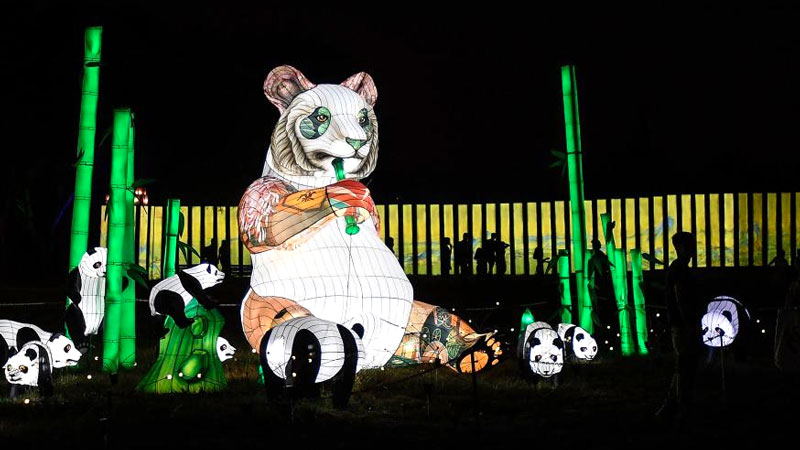SW China's Yunnan makes fresh progress in protecting Asian elephants
In 2021, a wandering herd of wild Asian elephants in southwest China's Yunnan Province went on a 1,400-kilometer "exodus" and returned to their original habitat 124 days later.

This aerial photo taken on May 28, 2021 shows a herd of wild Asian elephants in Eshan County, Yuxi City, southwest China's Yunnan Province. (Xinhua/Hu Chao)
The epic journey made Asian elephants in Yunnan famous around the world. It also showcased the province's unremitting efforts to protect Asian elephants and their habitats, as well as China's achievements in biodiversity conservation.
A year on, the story of the "short-nosed family" in Yunnan continues.
"The herd has grown bigger. Two baby elephants born on the adventurous elephants' journey have grown up. In January 2022, the herd welcomed new baby elephants," said Wang Bin, director of the Asian elephant protection and management center in Xishuangbanna Dai Autonomous Prefecture of Yunnan.
Recent monitoring found that the newborn baby elephants have grown to about 200 kilograms.
Meanwhile, the original herd of elephants has split into two, forming new families while looking for new partners. The two groups are now active in different locations in Xishuangbanna and often visit each other.
"The two elephant groups are very young, with the eldest being no more than 30 years old, and are healthy," Wang said, adding that the separation and reunion of elephant groups show that the local groups communicate frequently and the elephant population is constantly growing.
Yunnan is a habitat for wild Asian elephants in China. Despite the drop in the total population of elephants around the world, the number of wild Asian elephants in Yunnan has increased from about 150 to over 300 in the past decades.
Monitoring showed that almost every elephant herd has young elephants, and new members are born every year, according to Shen Qingzhong, a senior engineer from the Xishuangbanna National Nature Reserve.

Xu Yunfeng, a wildlife conservation worker, checks the leg of Asian elephant "Longlong" in Xishuangbanna Dai Autonomous Prefecture, southwest China's Yunnan Province, March 15, 2022. (Photo/Xinhua)
Yunnan has also continuously strengthened elephant rescue and breeding efforts and enhanced related research.
The Asian Elephant Breeding and Rescue Center, established in Xishuangbanna Dai Autonomous Prefecture in 2008, is a scientific research base that seeks to better rescue and breed Asian elephants. Over the past years, the center has rescued more than 20 wild Asian elephants, and carried out research in fields such as elephant breeding and habitat protection.
In July 2021, a baby elephant in Jinghong city of the autonomous prefecture was abandoned by its herd only about two months after it was born due to severe injuries in its leg. The elephant was rescued and sent to the center for treatment, and was named "Longlong." Under the care of wildlife conservation workers, "Longlong" returned to health.
Asian elephants constitute an important part of Yunnan's rainforest ecosystem, and have been included in the list of 48 critically endangered species under emergency protection during China's 14th Five-Year Plan period (2021-2025).
While the population of the species is growing, there is still a long way to go in the efforts being made to protect Asian elephants and their habitats and promote the harmonious coexistence between humans and elephants.
Yunnan is trying its best to resolve human-elephant conflicts by strengthening habitat protection and restoration, improving the quality of Asian elephants' habitats, and enhancing the construction of monitoring and early-warning, safety and emergency response systems, said Yang Hua, deputy director of the wildlife conservation division of the province's forestry and grassland bureau.
Yunnan introduced commercial insurance for damage caused by wildlife in 2010. Since then, it has invested about 617.6 million yuan (about $90.1 million) in this field.
The province has also established food source bases for Asian elephants and built a monitoring and alert system that tracks their movements with the help of infrared cameras, drones and elephant monitoring staff. Furthermore, the province is accelerating the building of the Asian elephant national park to better protect Asian elephants and promote harmonious coexistence between humans and elephants.
Stories of protecting Asian elephants serve as a vivid example of China's efforts to promote harmony between man and nature, said Yang Zicheng, an engineer with the Asian elephant research center under the National Forestry and Grassland Administration.
Photos
Related Stories
- China revises law on wildlife protection
- Black-necked cranes spend winter in southwest China nature reserve
- Species with extremely small populations being saved in China
- Yunnan makes great progress in protecting species with extremely small populations
- Wild elephants seen in Assam, India
- World Wildlife Conference opens in Panama with call to action at crucial moment for humanity
- Five African elephant calves born at conservation base in S China
- China's Yunnan province makes progress in protection of Asian elephants
- China publishes Atlas of Wildlife in SW China
- Wild elephants seen in Assam, India
Copyright © 2023 People's Daily Online. All Rights Reserved.









